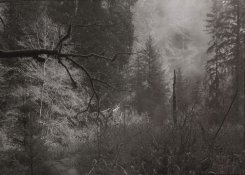i have spent most of my time photographing things in flat light, overcast days no harsh shadows
and always wanted to convey the sense of who the person was i was photographing, or give a sense of place
or let the building / site &c breathe, not so much use the light as a way of conveying these ideas.
when i wrote the original post in this thread i looked out through the trees across the amtrack rail to the bay
and it gave me a whole different perspective about things. i saw the darkness and haze of the thick stand of pine trees
on the other side of the bay, the houses on the coast and the foreground nearly vanished and all i saw was
the bay, some of it murky, some of it engulfed in shadow, some twinkling like a stary night, and some of it reflecting the sun so intensely that if i could have photographed it
it would have been such a graphic image, almost a photogram ... sometimes it is hard to see the forest through the trees
and understand what people mean when they say stuff, especially when they are talking almost poetically, or trying to explain
a concept they understand but can't put into words, and for the brief IDK 7 seconds i saw the bay like that, i sort of understood
what people meant when they say " i photograph the light" because most of the time, as i have mentioned, i did my best to NOT
photograph dramatic light, i tried to not photograph stark and deep shadows but some sort of other way.
i've thought about that drive a lot, and while that scene is something i can photograph if i want, almost any morning, i sometimes just drive by, or i just think about it, and it sometimes
reminds me that there are other things i can do when i am doing other things ...
thanks for the posts in this long thread, i'm glad it was dug up the other day, its been a nice read !




 )
)